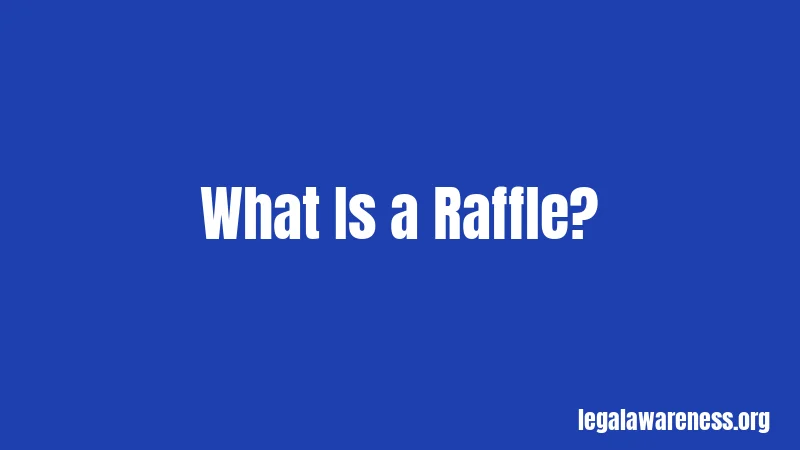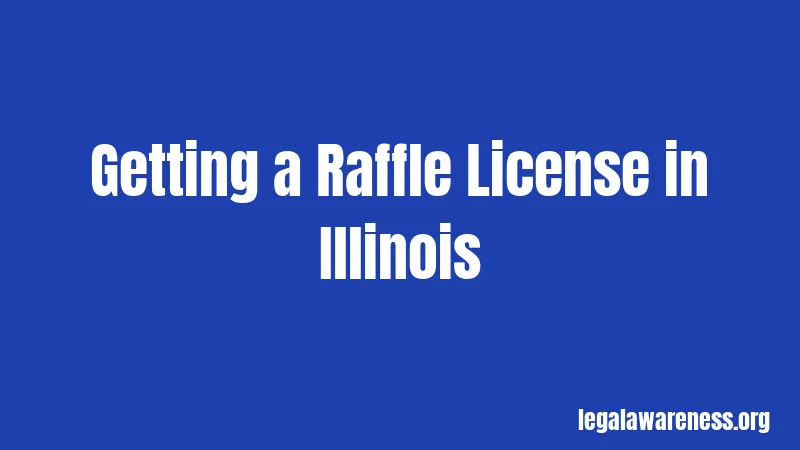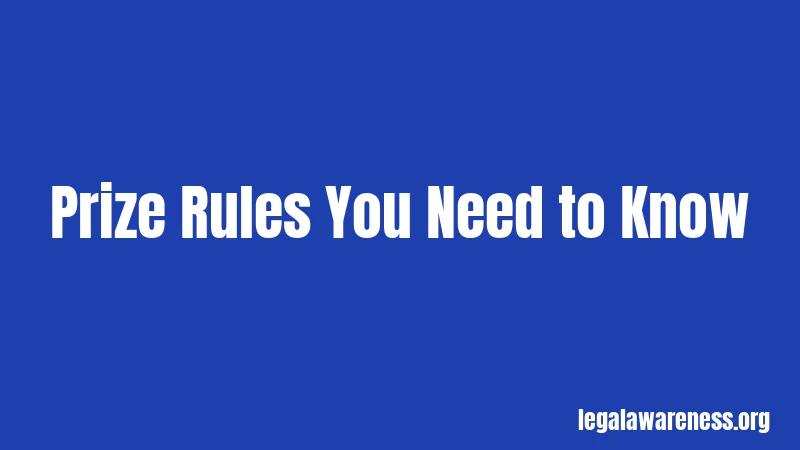Illinois Raffle Laws (2026): What’s Legal and What’ll Cost You
Most people think raffles are basically legal everywhere. Turns out, Illinois has some pretty specific rules about them. And honestly, these rules can surprise you. Let’s break down exactly what you can and can’t do when running a raffle in Illinois.
Think of raffles as a gray area in gambling law. They’re not quite the same as casino games. But they’re not totally free from regulation either. Illinois takes raffle rules seriously, and if you get it wrong, there can be real consequences.
What Is a Raffle?

A raffle is pretty straightforward. You sell tickets to people. Each ticket has a number or name on it. Then you randomly draw winners and give them prizes. That’s it. But here’s where it gets important: Illinois has very specific rules about who can run raffles and how they have to do it.
Not all raffles are created equal in Illinois. The state distinguishes between raffles run by certain organizations and raffles run by businesses or individuals. This distinction matters a lot legally.
Who Can Actually Run a Raffle in Illinois?
Here’s the critical part. Not everyone can run a raffle in Illinois. In fact, only certain organizations are allowed to do this legally.
Licensed charitable organizations can run raffles. These are nonprofits that have registered with the state. Religious organizations qualify. Educational institutions qualify. Civic organizations like the Rotary Club or Veterans groups can run them too. But here’s the catch: you need a license first.
Wondering if your organization qualifies? You’ll need to register with the Illinois Secretary of State or local authorities. Different counties have different requirements, so check with your local government first.
Individuals and for-profit businesses cannot run raffles in Illinois. Period. If you own a business and want to run a raffle to boost sales, sorry, that’s not allowed. If you want to run a personal raffle with friends, that breaks the law. The state is pretty strict about this one.
Getting a Raffle License in Illinois

Okay, so your organization qualifies. What’s next? You need a license.
To get a raffle license in Illinois, you’ll file an application with your local municipality or county. Different areas have different application processes, but they all require similar information. You’ll need to provide details about your organization, the raffle details, and how you’ll use the money.
The application typically includes information about the prizes, ticket prices, and how many tickets you’ll sell. You’ll also need to explain what the raffle money will be used for. Most organizations use raffle funds for charitable purposes, and the state wants to know this upfront.
Processing time varies. Some counties approve applications quickly. Others might take a few weeks. Start your application early, honestly. Don’t wait until the last minute.
Basic Rules for Running a Legal Raffle
So you’ve got your license. Now what? Here are the basic rules you absolutely must follow.
First, you can’t advertise raffles on television, radio, or most digital platforms in Illinois. This is a big one that surprises people. You can advertise locally through newspapers and flyers. You can tell people in person. But broad media advertising? That’s off limits.
Second, you need to keep detailed records. Write down how many tickets you sold. Record the ticket prices. Keep a list of all winners and prizes awarded. Keep receipts for prize purchases. The state might want to review these records later, and if you don’t have them, you could face problems.
Third, you must conduct the drawing in public. You can’t pick winners in private and then announce them. The drawing needs to happen where people can see it. This ensures fairness and transparency.
Fourth, ticket prices matter. Illinois limits how much you can charge per ticket. The exact price limit varies by organization type and county regulations. Generally, tickets are inexpensive (think a few dollars each), but check with your local authority about specific limits in your area.
Prize Rules You Need to Know

Hold on, this part is important. Prizes have rules too, and lots of people get this wrong.
In Illinois, raffle prizes can’t exceed a certain value. The state limits how much each prize is worth. This prevents raffles from turning into something closer to actual gambling. Most regulations cap individual prizes at amounts like $500 to $1,000, but this varies.
You must announce what the prizes are before the drawing. People buying tickets need to know what they could win. Hide the prizes or change them after people buy tickets? That’s illegal and fraudulent.
The prizes you offer must actually exist and be deliverable. You can’t promise a car if you don’t actually have a car to give. You can’t offer a vacation if you haven’t secured the deal with a hotel or resort.
Penalties if You Break the Rules
Let’s talk about what happens if you run an illegal raffle. Trust me, you want to avoid this.
Running an unlicensed raffle is a criminal offense in Illinois. Depending on the violation, you could face charges for disorderly conduct or more serious crimes. A disorderly conduct charge is typically a misdemeanor.
Fines can range significantly. A simple violation might result in fines of $100 to $500. More serious violations can mean fines of $1,000 or more. In some cases, individuals have faced fines reaching $2,500 or higher.
Jail time is possible too. For misdemeanor charges, you could face up to 30 days in jail. More serious violations could result in longer sentences, though this is less common for first-time raffle violations.
If you’re an organization running an illegal raffle, you could lose your charitable status. That’s serious. Your nonprofit registration could be revoked, which means you lose tax benefits and credibility.
You might also face civil liability. If someone bought a ticket and didn’t get the promised prize, they could sue you personally or as an organization.
Special Rules for Different Types of Organizations
Different organizations have slightly different rules. Makes sense, right?
Licensed charitable organizations often have more flexibility with raffle rules. They face less regulation than for-profit entities would. But they still need licenses and must follow state rules.
Religious organizations usually have good standing with the state for raffles. Many churches and synagogues run raffles as fundraisers. They still need licenses, but the process is often streamlined.
Educational institutions have special permissions too. Schools and universities can often run raffles more easily than other organizations. Some states even allow schools certain gambling permissions that regular nonprofits don’t have.
Veterans groups and civic organizations have specific licenses available. The Disabled American Veterans, American Legion, and similar groups can apply for special raffle licenses tailored to their organizations.
What About Online Raffles?
Here’s where things get interesting. Online raffles are basically not allowed in Illinois through traditional means. You can’t run a raffle entirely online where people buy digital tickets.
Some organizations use online platforms just for promoting or managing tickets that are still purchased in person. That’s different. But accepting ticket payments online and conducting the entire raffle digitally? That ventures into gambling territory, and it’s not permitted for regular raffles.
If you’re thinking about doing anything online related to raffles, check with your local authorities first. The rules around this are evolving, and what’s allowed varies by county and municipality.
Recent Changes to Illinois Raffle Laws
Illinois updated its gambling and raffle regulations over the past few years. Some municipalities have made enforcement stricter. Others have tried to make the licensing process more convenient.
In 2023 and beyond, some counties started implementing online license applications. This makes things easier for qualifying organizations. But the underlying raffle rules haven’t fundamentally changed.
The state continues to focus on preventing unlicensed raffles. Enforcement has increased in some urban areas. If you’re running a raffle, staying compliant is more important than ever.
How to Report an Illegal Raffle
Suspect someone’s running an illegal raffle? You can report it. The process is straightforward.
Contact your local police department or sheriff’s office. They handle gambling complaints in most areas. Provide details about the raffle, where it’s happening, and who’s running it.
You can also contact your county state’s attorney office. They handle gambling violations in some jurisdictions. They’ll investigate if there’s evidence of illegal activity.
Illinois also has a statewide gambling hotline through the Illinois Gaming Board. You can report violations there too.
Frequently Asked Questions
Can I run a small raffle with friends for fun? Not legally. Even a small, informal raffle among friends violates Illinois law unless your group is a licensed organization. Stay safe and skip it.
What if I run a raffle without knowing it was illegal? Ignorance doesn’t protect you legally. If you ran an unlicensed raffle, you could still face charges and penalties even if you didn’t know it was illegal.
Can nonprofits run multiple raffles per year? Yes, licensed organizations can run multiple raffles. But each raffle might require its own permit. Check with your local municipality about frequency limits.
Are there limits to how much money a raffle can raise? Some counties limit total raffle revenue per year or per event. Check your local rules to see if there are caps on fundraising amounts.
What if someone wins but I can’t pay the prize? This is a serious problem. You’re legally obligated to pay advertised prizes. If you can’t, that’s fraud. Always make sure you can actually fund all prizes before running the raffle.
Final Thoughts
Illinois raffle laws exist for good reasons. They protect people from fraud. They ensure that charitable organizations actually use raffle money for their charitable missions. And they keep gambling regulated.
Here’s the bottom line: if you want to run a raffle in Illinois, get licensed first. Follow the rules about advertising, record-keeping, and prize limits. Conduct your drawing publicly and transparently. Do this, and you’re good.
If you’re unsure about anything, ask your local municipality or county clerk. They can walk you through the specific requirements in your area. It’s better to ask questions upfront than to deal with legal trouble later.
Now you know the basics. Stay informed, follow the rules, and when in doubt, check with your local authorities.
References
Illinois Secretary of State Charitable Organization Registration
Illinois Criminal Code – Gambling Offenses
